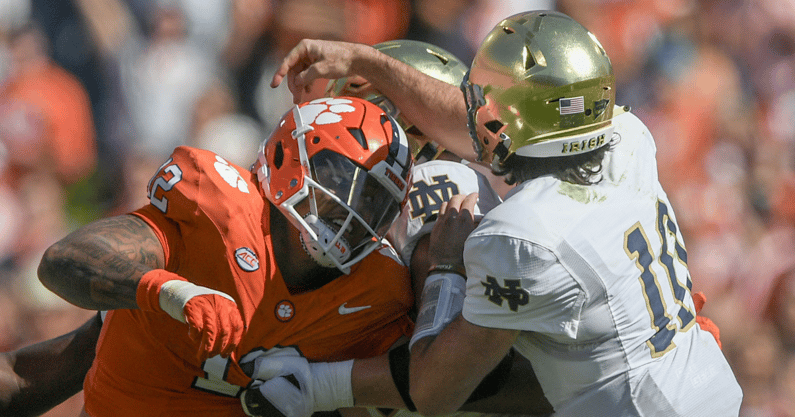Joel Klatt: Clemson is very smart for scheduling agreement with Notre Dame

Clemson and Notre Dame announced a collaborative scheduling agreement that will see the two teams meet for 12 straight years starting in 2027. It’s a blockbuster scheduling deal.
FOX Sports’ Joel Klatt broke down just how savvy a move it was for both programs in a recent episode of The Joel Klatt Show. He was thorough.
“Clemson and Notre Dame announce a 12-year scheduling agreement starting in 2027. Now, listen, this is great for Notre Dame,” Klatt said. “This locks in a big-time opponent on their schedule for years to come. And as an independent they need to have those marquee games that drive television revenue, that continue to keep that marketability for them as an independent afloat. That’s great. So for Notre Dame this is kind of no-brainer.”
There are two parties to the scheduling agreement, though. So how does Clemson come out?
“Now from Clemson’s perspective, you might be thinking to yourself like, ‘Don’t they already play in this Notre Dame-ACC agreement?'” Klatt said. “Yes, they do. And if they were to not do this agreement Clemson would play Notre Dame five times in that 12-year stretch, rather than all 12.
“Now here’s what’s interesting about this, is that Clemson is using their leverage as a huge program, a blockbuster program, national championship winning coach, going to the College Football Playoff last year, and they’re looking at this and they’re thinking to themselves, ‘We need to get out ahead of what is now a new structure within the ACC as it relates to revenue distribution.’ This is very smart from Clemson’s standpoint.”
Both programs are essentially using each other to bolster their own profile. It’s similar to how leagues themselves have worked to create scheduling agreements in recent years to try to produce the same effect.
But there’s also a financial reason why this makes a ton of sense for Clemson. Klatt explained.
“They’re going to lock in the biggest television draw they can possibly lock in, which is Notre Dame,” Klatt said. “And now the ACC is going to begin distribution revenue partially based on television ratings. Now, not fully based on that, but partly. This is that whole Florida State was kind of suing them and there was talk about whether they were going to remain in, and then a couple of the teams basically got concessions about unequal revenue share, which I don’t mind for the schools that are driving the bulk of the revenue in that conference.
Top 10
- 1New
DJ Lagway
Signs NIL deal with Jordan
- 2
Youtube TV, FOX
Dispute ends
- 3Hot
Micah Parsons traded
Cowboys star in NFL blockbuster
- 4
Rick Barnes
Vols coach signs lifetime contract extension
- 5Trending
Taylor Swift
Arrives at Nebraska-Cincy game
Get the Daily On3 Newsletter in your inbox every morning
By clicking "Subscribe to Newsletter", I agree to On3's Privacy Notice, Terms, and use of my personal information described therein.
“And clearly Clemson and Florida State and Notre Dame, with that scheduling agreement, do that. So now Clemson on an annual basis is going to be able to lock in Notre Dame regardless of how their rotation would land in the ACC scheduling. Smart. Very smart. And a decision that was made not with anybody else in mind, but with themselves in mind.”
That’s how it has to be done in college football these days. The scheduling agreement decision isn’t so much selfish as it is self-preservation.
“And by the way, this is what I always talk about in college football, which is, everybody within college football is incentivized to look out for themselves,” Klatt said. “Again, not a knock, that’s just the structure that we live in. So Clemson is looking out for themselves.
“We operate in this sport in silos. Conferences do it, schools do it. When you think about it from an individual school’s perspective, you can always look at it from a scheduling perspective. How do they schedule? Do they benefit themselves from a value standpoint? Do they benefit themselves from a competitive standpoint? And they get to make those decisions and they get to operate in a silo. Do those decisions necessarily make their conference or the sport overall stronger? Doesn’t matter. It doesn’t matter.”